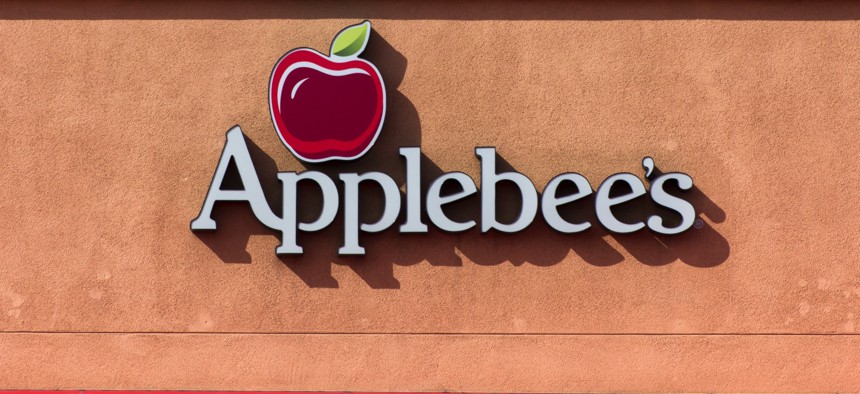Tax Incentives Can’t Keep Applebee’s in Kansas City; Montana’s Geosynthetic Highways

Ken Wolter / Shutterstock.com
Also: Olympia City Hall attacked and Texas governor’s mission to Mexico City.
Here’s some of what we’ve been reading this weekend ...
KANSAS CITY, Missouri: Back in 2012, Applebee’s International Inc., the company that owns the Applebee’s restaurant chain, ditched its longtime slogan, “Eating Good in the Neighborhood,” for “See You Tomorrow.” But in the case of Kansas City, Applebee’s corporate headquarters won’t be saying “See You Tomorrow” much longer. It’s high-tailing it to Glendale, California, just outside Los Angeles. As The Pitch alt-weekly notes, Applebee’s departure from Kansas City—some back office jobs will remain in Missouri—isn’t exactly the best example of the use of tax incentives for long-term economic development. Applebee’s moved from Lexana, Kansas, across the Missouri state line to Kansas City in 2011, lured by $12.5 million in Missouri Quality Jobs tax incentives. According to The Pitch:
Missouri Quality Jobs was meant to last five years, which makes Applebee's corporate relocation after four years of sopping up withholding taxes seem particularly cynical.
The incentive was meant to lure jobs to Missouri, even though the move from Lenexa to just across the state line wasn't far enough for Missouri to meaningfully call the 390 Applebee's employees who made the move to Ward Parkway "new jobs." The main benefit in retrospect was that it filled some of an office building near Ward Parkway Mall that had been left mostly empty after subprime mortgage company NovaStar supernova-ed during the housing crash of 2008.
While the corporate side of Applebee’s is moving to California, fans of the chain in the Kansas City still have a handful of locations to choose from. [Los Angeles Business Journal; The Pitch]
MISSOULA, Montana: While it might not surprise highway engineers, most drivers probably don’t realize the extent of the use of geosynthetic fabrics in road construction. In Montana, the Missoulian reports, 75 percent of state roads have some sort of textile layer:
“There are lots of different products coming onto the market with different shapes and sizes and different ways of building these products,” said Eli Cuelho of the Western Transportation Institute at Montana State University in Bozeman. “So the states are interested in knowing what properties of these products most relate to their performance.”
Besides strength, geosynthetics are popular by state highway departments for another big reason: Gravel needed for construction is harder to find these days. [Missoulian]
OLYMPIA, Washington: City Hall in Washington state’s capital sustained damage from a group of protesters who took to the streets Saturday night with bats, golf clubs and “large socks with metal objects in them.” As KOMO News reports, the “marchers had no signs, and were wearing masks, camouflage or dark hoodies. Witnesses say their chants were anti-police.” The group disbanded and scattered when police arrived. [KOMO News]
CIUDAD de MEXICO, Distrito Federal: Texas Gov. Greg Abbott is leading a delegation to the capital of Mexico in an effort to promote better relations between the Lone Star State and its neighbor to the south. Don’t expect any major breakthroughs, The Dallas Morning News reports:
Longtime Mexico observers, including former U.S. Ambassador to Mexico Tony Garza, play down expectations surrounding Abbott’s visit. But Garza, an informal adviser to Abbott, said that a turnaround in attitudes toward Mexico is key, if not for cultural and historical ties, then for economic opportunity. Mexico is the world’s 15th-largest economy; Texas would be 12th if it were a sovereign nation.
After years of sometimes tense relations between U.S. border states and Mexico over issues like immigration, “efforts to slow-dance back into Mexico’s good graces rely on the fundamentals of the relationship—largely politics and economics.” [Dallas Morning News]
LONG ISLAND SOUND, Connecticut: The Nutmeg State, like so many others, faces tough challenges involving the health of its watersheds. And nitrogen runoff might be enemy No. 1 for Long Island Sound, which is starving the body of water of oxygen. While nitrogen releases have been curbed at many municipal wastewater treatment plants, the Connecticut Post reports there’s a bigger source of nitrogen that’s harder to rein in: private sewage septic tanks. [Connecticut Post]
(Photo by Ken Wolter / Shutterstock.com)
Michael Grass is Executive Editor of Government Executive’s Route Fifty.
NEXT STORY: FirstNet rocks test deployment at Jersey shore






